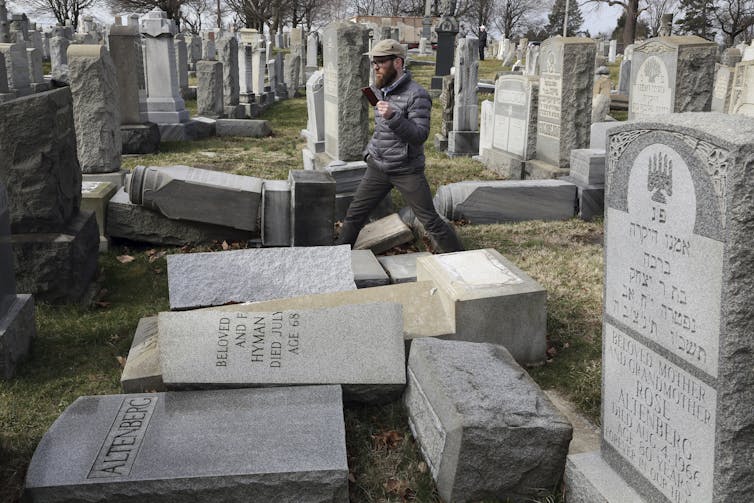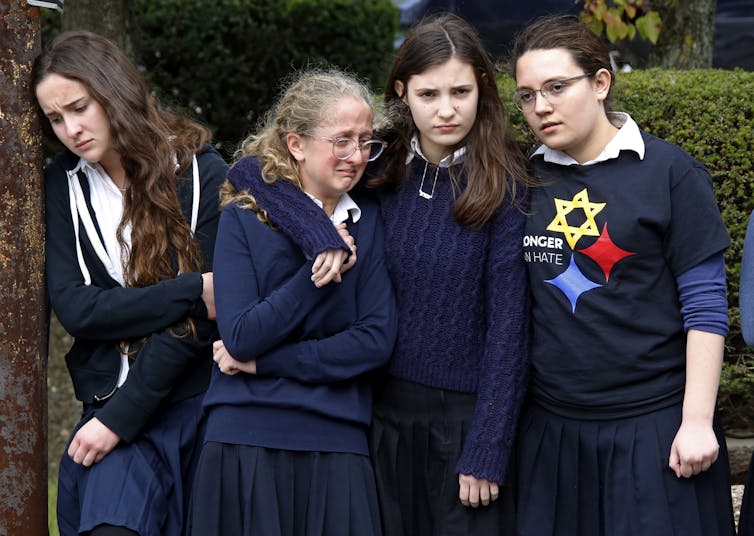With anti-Semitism on the rise again, there are steps everyone can take to counter it
- Written by Jamie Levine Daniel, Assistant Professor, Paul H. O'Neill School of Public and Environmental Affairs, IUPUI
Keeping track of all the attacks against American Jews these days is just about impossible unless it’s your full-time job. Consider these incidents, some of many that occurred or came to light just during the month of August 2019:
We are[1] professors[2] who teach public administration, a field that prepares students for government and nonprofit jobs. We have all worked in the public and nonprofit sectors, and we also are all Jewish.
We never hid our religious identity before, but we also did not highlight it in our classrooms – until now.
All of us believe we have a responsibility to train our students to work with diverse staff and serve diverse communities. After the mass shooting at Pittsburgh’s Tree of Life synagogue on Oct. 27, 2018 - the deadliest attack on Jews in U.S. history[3] - and other alarming acts[4], we sought resources to help us address this tragedy. More broadly, we wanted to better equip our students to address anti-Semitism.
Since we could not find the specific books or scholarly articles in our field that we needed to teach our students to understand anti-Semitism, we wrote our own article[5] that appeared in the Journal of Public Affairs Education, an academic publication.
 Rabbi Joshua Bolton of the University of Pennsylvania’s Hillel center surveyed headstones at Mount Carmel Cemetery in Philadelphia that were vandalized in 2017.
AP Photo/Jacqueline Larma[6]
Rabbi Joshua Bolton of the University of Pennsylvania’s Hillel center surveyed headstones at Mount Carmel Cemetery in Philadelphia that were vandalized in 2017.
AP Photo/Jacqueline Larma[6]
What it is
Anti-Semitism, the prejudice against or hatred of Jews[7], can take the form of physical attacks, the expression of negative stereotypes [8] or the promotion of hostility against Jewish people.
The most violent anti-Semitic acts[9], which the federal government considers a growing domestic terrorist threat[10], tend to attract the most attention.
But anti-Semitic acts can also manifest as microaggressions[11], which the education and psychology scholar Derald Wing Sue[12] defines as “everyday verbal, nonverbal, and environmental slights, snubs, or insults, whether intentional or unintentional, which communicate hostile, derogatory, or negative messages to target persons based solely upon their marginalized group membership.”
These microaggressions are further compounded for Jews with intersectional[13] identities[14] – that is, those who are also people of color, LGBTQ, immigrants or members of other minority communities.
Although less than 2% of U.S. adults are Jewish[15], there continues to be evidence that anti-Semitism is on the rise[16]. Almost 90% of American Jews surveyed identified anti-Semitism as a problem, and 84% agreed that it has increased over the past five years - a perspective backed by data collected by Anti-Defamation League[17], an international nonprofit that tracks and fights anti-Semitism and all forms of bigotry.
“This hatred is real, comes from multiple sources, and is growing,” David Harris[18], who leads the American Jewish Committee, an advocacy organization, said. “It needs to be taken seriously and dealt with in a sustained, multipronged response.”
The toll it takes
As professors of public administration, we are particularly interested in the toll that anti-Semitism can take on the work government agencies and nonprofits do.
For example, Jewish organizations[19] large and small are spending a growing amount of their time and money on security. Synagogues and community centers[20] are hiring armed guards and training volunteers and members of their congregations and organizations to become more vigilant.
Anti-Semitism can also interfere with the provision of government and nonprofit services.
In September, the sociology department at Wake Forest University in Winston-Salem, North Carolina, canceled classes[21] for a week after a dozen members of the faculty[22] received offensive, anonymous emails with anti-Semitic sentiments.
Microaggressions can be disruptive, too. For example, Jews are forced to either forgo the observance of important Jewish holidays[23], such as Rosh Hashanah, the Jewish New Year, and Yom Kippur, the Day of Atonement, or skip key events when they are only offered on those days.
We believe that these scheduling conflicts, even when they are unintentional, convey the implicit message to Jews we are not truly part of our workplaces and communities.
Even when there are no schedule conflicts, many Jewish employees have to use vacation days or unpaid time off[24] to observe holidays, especially when they fall on weekdays. Jewish students[25] in most U.S. counties risk having their absences being treated as unexcused when they go to services instead of school or travel to observe religious holidays with their extended families.
A recent Twitter thread initiated by Rabbi Sara Zober[26] highlights the struggles faced not just by American Jews but also by members of other religious minorities in systems that are set up to support Christian religious observance. To kick things off, she tweeted: “My middle schooler was marked "unexcused - domestic” for Rosh Hashanah, despite me letting them know two weeks early. That’s the same designation as if I kept him home from school waiting for a FedEx package.“
We do, however, see some steps in the right direction. A new Washington State law[27], for example, requires colleges and universities to "reasonably accommodate” any student when observing a religious holiday coincides with their academic obligations.
But some of the nonviolent anti-Semitic acts we find the most troubling are perpetrated by government leaders. Recently, two Trenton, New Jersey city council members[28] used variations of the offensive slur[29] “Jew them down.”
Demeaning language like that signals to Jewish constituents that they are not equal members of the community.
 Students from the Yeshiva School in the Squirrel Hill neighborhood of Pittsburgh during a funeral for one of the people slain during the Tree of Life mass shooting.
AP Photo/Gene J. Puskar[30]
Students from the Yeshiva School in the Squirrel Hill neighborhood of Pittsburgh during a funeral for one of the people slain during the Tree of Life mass shooting.
AP Photo/Gene J. Puskar[30]
What you can do
As we work to train government and nonprofit leaders to address issues like anti-Semitism, we also have identified four simple steps that anyone can take to counter it.
First, before you schedule events, you can check your calendars for the Jewish holidays[31]. This is especially relevant in September and October, and in the springtime[32]. These practices should also encompass holidays other religious minorities celebrate, such as Ramadan for Muslims[33] and Diwali for Hindus[34].
Second, do not presume that the Jewish person, or anyone else belonging to a minority group, in your workplace will speak up to stave off a schedule conflict related to their holidays. Being a good ally means not placing the burden on them to constantly raise the issue.
Third, when an anti-Semitic incident makes headlines, reach out to your Jewish co-workers, and other people in your circles. Let them know you see them, acknowledge their pain and are thinking of them.
Finally, try to engage in efforts to combat anti-Semitism in your community. This could mean getting involved with your local chapter of the Anti-Defamation League[35] or similar groups. It can also entail participating in interfaith alliances, such as the Muslim-Jewish Advisory Council [36].
The feedback we have gotten in response to our academic article suggests that it’s already helping public and nonprofit leaders learn to talk about anti-Semitism in particular, and inclusion and social equity[37] issues in general. However, we believe that everyone has a responsibility to do something about this problem.
[ Like what you’ve read? Want more? Sign up for The Conversation’s daily newsletter[38]. ]
References
- ^ are (www.unomaha.edu)
- ^ professors (evans.uw.edu)
- ^ the deadliest attack on Jews in U.S. history (www.adl.org)
- ^ other alarming acts (theconversation.com)
- ^ wrote our own article (doi.org)
- ^ AP Photo/Jacqueline Larma (www.apimages.com)
- ^ prejudice against or hatred of Jews (encyclopedia.ushmm.org)
- ^ negative stereotypes (www.myjewishlearning.com)
- ^ most violent anti-Semitic acts (www.adl.org)
- ^ domestic terrorist threat (www.hstoday.us)
- ^ microaggressions (www.vox.com)
- ^ Derald Wing Sue (www.tc.columbia.edu)
- ^ Jews with intersectional (aapf.org)
- ^ identities (doi.org)
- ^ 2% of U.S. adults are Jewish (ajpp.brandeis.edu)
- ^ anti-Semitism is on the rise (www.ajc.org)
- ^ data collected by Anti-Defamation League (www.adl.org)
- ^ David Harris (ejewishphilanthropy.com)
- ^ Jewish organizations (www.jta.org)
- ^ Synagogues and community centers (ejewishphilanthropy.com)
- ^ canceled classes (www.washingtonpost.com)
- ^ dozen members of the faculty (wakeforestreview.com)
- ^ important Jewish holidays (www.myjewishlearning.com)
- ^ vacation days or unpaid time off (www.eeoc.gov)
- ^ Jewish students (brilliantmaps.com)
- ^ Rabbi Sara Zober (twitter.com)
- ^ Washington State law (www.pri.org)
- ^ two Trenton, New Jersey city council members (whyy.org)
- ^ offensive slur (www.jta.org)
- ^ AP Photo/Gene J. Puskar (www.apimages.com)
- ^ Jewish holidays (cdn.fedweb.org)
- ^ the springtime (www.vox.com)
- ^ Ramadan for Muslims (theconversation.com)
- ^ Diwali for Hindus (www.bbc.co.uk)
- ^ Anti-Defamation League (www.adl.org)
- ^ Muslim-Jewish Advisory Council (www.muslimjewishadvocacy.org)
- ^ inclusion and social equity (www.communityinclusion.org)
- ^ Sign up for The Conversation’s daily newsletter (theconversation.com)
Authors: Jamie Levine Daniel, Assistant Professor, Paul H. O'Neill School of Public and Environmental Affairs, IUPUI

